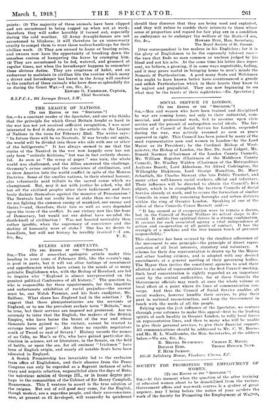SOCIAL SERVICE IN LONDON.
(To THE EDITOR OF THE "SEELTATOR."1 Sts,—Men and women who here been trained and disciplined by war are coming home, not only to their industrial, com- mercial, and professional work, but to re-enter upon civic service and the pursuit of unforgotten social ideals. The for- mation of a Council of Social Service for London, suspended during the war, was actively resumed as soon as peace appeared in sight. This Council has been joined by many of the most representative men and women in London—by the Lord Mayor as its President; by the Cardinal Bishop of West- minster, the Bishop of London, the Rev. Dr. Scott Lidgett, Mr. Ronald Norman (Chairman of the London County Council), Mr. William Regester (Chairman of the Middlesex County Council), Mr. Woolley Walden (Chairman of the Metropolitan Asylums Board), Lord Aldenham, Sir Alfred Codrington. Sir Willoughby Dickinson, Lord George Hamilton, Dr. Mary Scharlielt, Sir Charles Stewart (the lath Public Trustee). rind many other well-known social workers, official and voluntary. Their influence will be directed to obtain the Council's first object, which is to strengthen the fourteen Councils of Social Service already- at work, and to secure the formation of similar Councils in some fifty remaining boroughs and urban districts within the ring of Greater London. Speaking of one of the oldest of these Councils Canon Barnett said1-
"It has seemed as if co-operation were to remain a dream. but in the Council of Social Welfare its actual shape is dis- cerned. It enlists free spiritual forces in a strong combination. It secures for each associated ageing a vital independence of action and co-operation at all points of contact. It has I he strength of a machine and the free human tonell of personal responsibility."
This character has been secured by the steadfast adherence of the movement to one principle—the principle of direct repre- sentation of all local interests, statutory and voluntary. A scheme for their dine representation is drawn up by the Mayor end other leading citizens, and is adopted wills any desired amendments at a general meeting of their governing bodies. The Mayor then invites the constituent agencies to send their allotted number of representatives to the first Council meeting. Such local concentration is rightly regarded as an important asset by the central authorities, for at these Councils the Government officials may reach at once the whole volume at local effort at a point where its lines of communication con- verge. And thus the Council of Social Service enables all social workers, however humble their service, to play their part in national reconstruction, and keep the Government in touch with the needs of all the people.
Relying upon the just influence of the Spectator, we venture through your columns to make this appeal—first to the leading spirits of each locality in Greeter London, to rally local forces on representative lines, and then to many who Will be unable to give their personal services, to give their financial support. All communications should be addressed to Mr. C. W. Burnes and Mr. H. L. Woollcombe, the Hon. Secretaries, at the address below.—We are, Sir, stc., R. MELVILL BFACHCROFT. CHARLES E. Mu tr.T.
DOCGLAS ETRE. Truism Hsseoez Ness.
P. Hun JACERON.
84540 Salisbury House, Finsbur.? Circus, E.C.


































 Previous page
Previous page